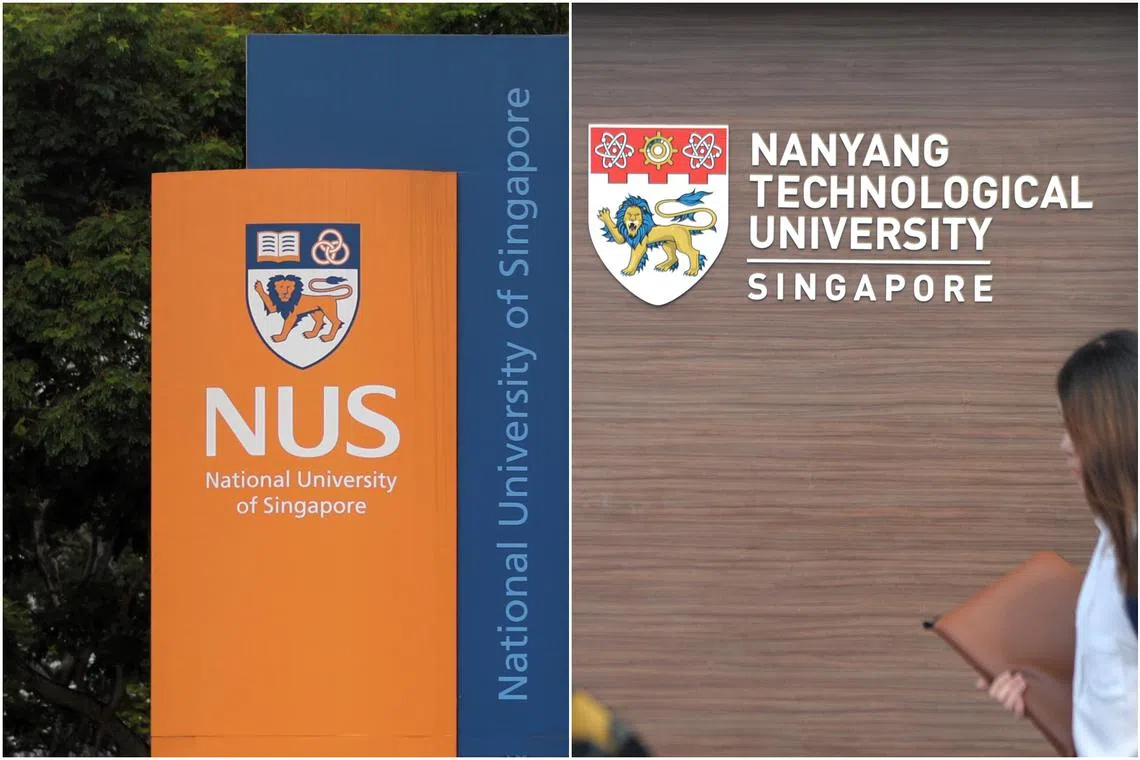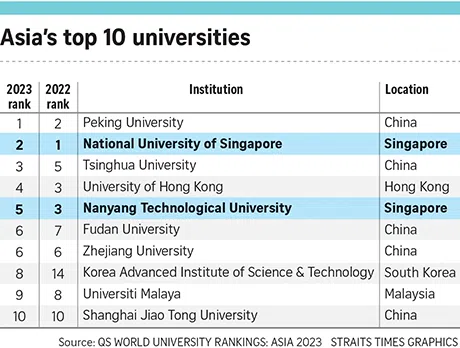Asia’s top universities: NUS slips to 2nd place, NTU ranks 5th
Sign up now: Get tips on how to help your child succeed

NUS lost its place as Asia’s No. 1 university over the past four years, while NTU slipped to fifth spot from third.
ST PHOTOS: GAVIN FOO, KELLY HUI
Follow topic:
SINGAPORE - The National University of Singapore (NUS) came in second in an annual ranking of institutions in the region, losing its place as Asia’s No. 1 university over the past four years.
China’s Peking University took the top spot in the latest Quacquarelli Symonds (QS) ranking of Asia’s universities released on Tuesday.
Nanyang Technological University (NTU) slipped to fifth spot in the list by the Britain-based higher education consultancy that highlights Asia’s top universities. NTU was placed third last year, together with the University of Hong Kong.
This year’s QS Asia Rankings are the largest, featuring 760 universities, up from 687 in the previous year. It evaluated institutions based on several factors, including academic and employer recognition, research, resources and the proportion of international faculty and students.
China’s Tsinghua University came in third and the University of Hong Kong was placed fourth.
China is the region’s most represented location, with 128 institutions making it to the list, followed by India with 118, and Japan with 106.
QS senior vice-president Ben Sowter said: “Singaporean higher education has much to be proud of. For nearly a decade, it dominated the top tier of QS’ Asia University Rankings, holding two of the top three spots and retaining the No. 1 position – occupied by NUS or NTU. Despite this year’s slight decline, both its leading institutions are among Asia’s top five.
“With two of Asia’s premier research institutions calling Singapore home, its contribution to the body of work enhancing global understanding in science and technology, among other fields, cannot be understated.”
NUS is Asia’s second-most well-regarded university among international academics, based on QS’ academic reputation indicator, just behind the University of Tokyo, QS said in a statement.
NTU was placed ninth regionally for academic reputation.
According to QS’ measure of scholarly impact in terms of citations per paper, as well as international collaboration, NUS and NTU are both among the region’s top five.
QS said Singapore’s primary field of research is in engineering and technology, specifically petroleum engineering and computer science.
But Singapore’s institutions did not rank among the region’s top 100 in terms of number of staff with PhD.
An NUS spokesman said: “As one of Asia’s top universities, NUS will continue to build on our strong track record in education, research, innovation and enterprise.
“Our recognition as a leading university in the region and the world is an affirmation of the excellent work of our talented community of faculty, researchers, staff, students and alumni, as they work together to break new ground in teaching, learning and research.”
The spokesman added: “We have set our sights on nurturing future-ready graduates... while cultivating a stellar pool of faculty and researchers... to push new frontiers and deepen the translational impact of our research.”
An NTU spokesman said: “Fluctuations in rankings from year to year are to be expected, especially in the upper echelons of top global indices where competition remains intense.”
NTU takes a broad view of its performance over multiple years across various established rankings, he added.



